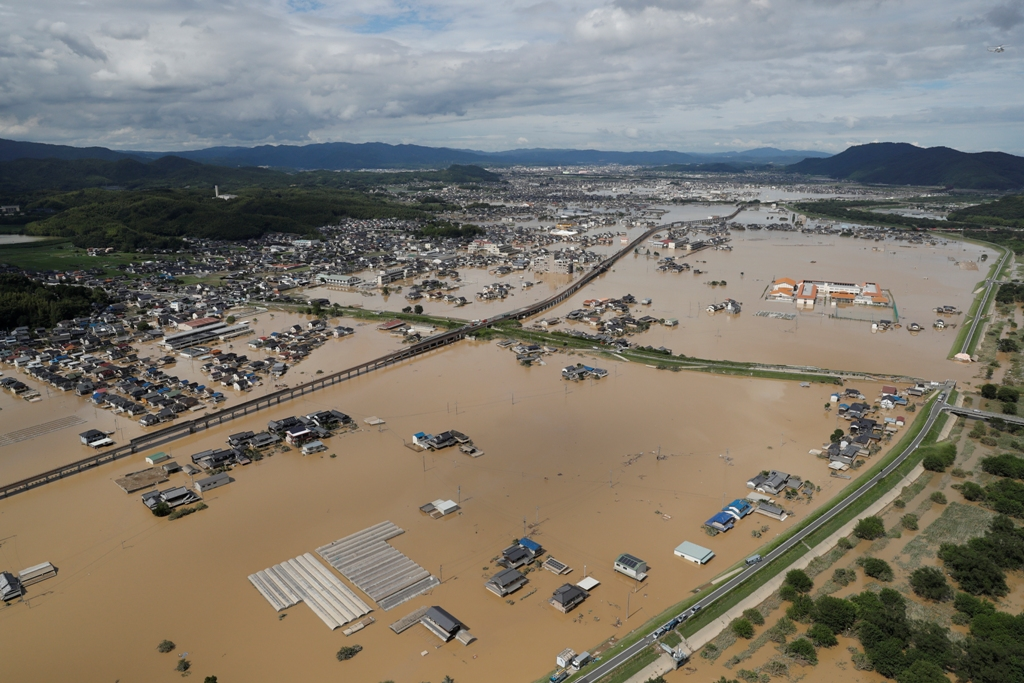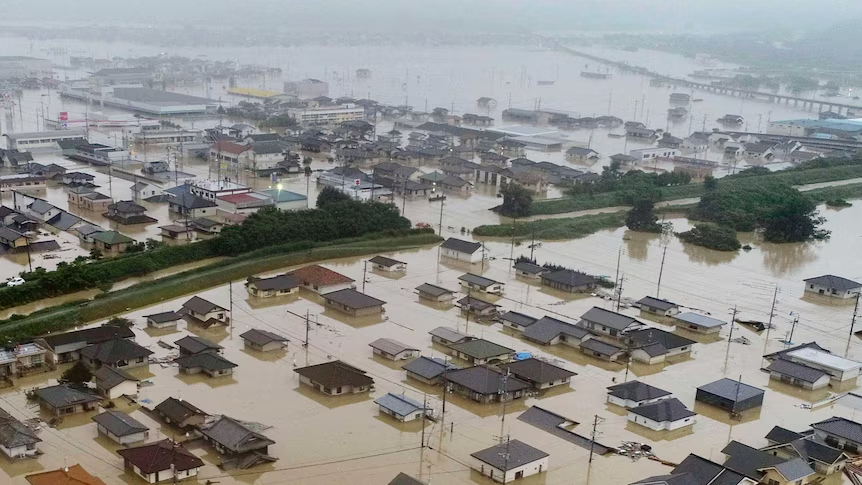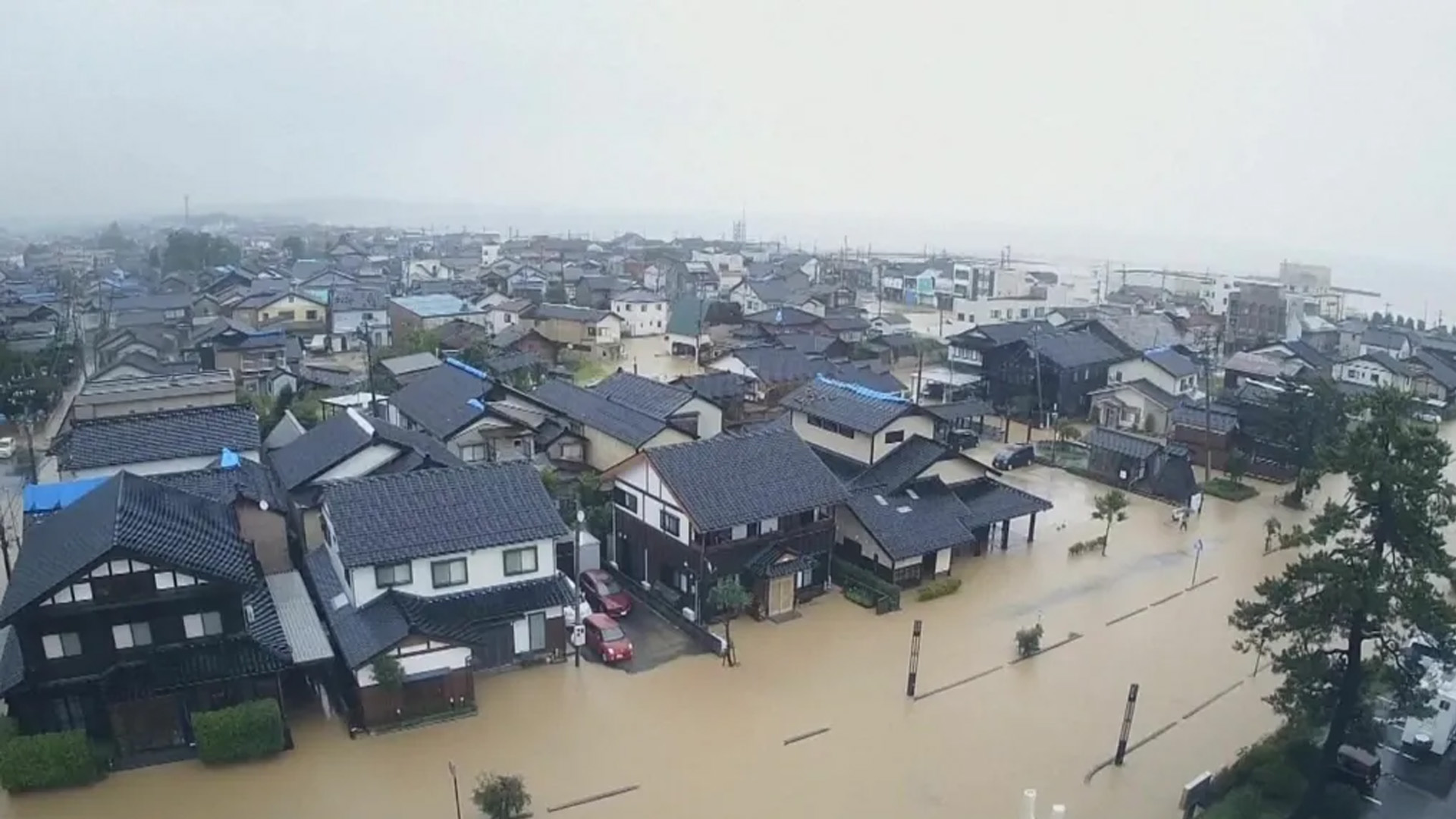Japan orders evacuation in response to devastating floods and landslides that have wreaked havoc in the central region of Ishikawa, leaving one person dead and seven missing.
Unprecedented rains triggered the disaster, forcing local authorities to take swift action to protect tens of thousands of residents. The situation remains dire, with rivers overflowing, roads blocked by landslides, and numerous households left without power or communication services.
Impact of Unprecedented Rainfall in Ishikawa
Japan orders evacuation as heavy rainfall leads to catastrophic floods in Ishikawa, marking one of the most severe weather events in recent history. The Japan Meteorological Agency (JMA) issued its highest-level warning, emphasizing the life-threatening situation in the region.
Ishikawa has been hit by continuous downpours, with over 120mm of rainfall recorded per hour in the city of Wajima, the highest since records began in 1929. Floodwaters have inundated streets and homes, creating hazardous conditions for residents.
Read : Prince Hisahito Becomes Japan’s First Royal Male to Turn 18 in 40 Years Amid Population Crisis
The decision to evacuate affected areas came as rivers across Ishikawa burst their banks. A dozen rivers were reported to have overflowed, causing widespread flooding and isolating several communities. In Wajima, residents woke up to find their entire streets submerged, and many were forced to flee to higher ground.
Read : Osaka Castle: A Timeless Icon of Japan’s Rich History
Japan orders evacuation not just in Ishikawa, but also in neighboring Niigata and Yamagata prefectures, where 16,700 people have been told to evacuate due to the risk of further flooding and landslides.
Landslides and Missing Workers
The floods and landslides have resulted in tragic consequences, with one confirmed death and several people still unaccounted for. Japan orders evacuation as rescue operations face significant challenges due to blocked roads and unsafe conditions.

In Ishikawa, four workers who were part of a team sent to restore a road damaged by a recent earthquake went missing after a landslide struck the area.
The team of 60 workers had been repairing the road when the disaster hit, and some workers took shelter in a nearby tunnel. However, efforts to reach the missing individuals have been delayed, as rescue teams were blocked by additional landslides.
In the midst of these rescue efforts, Japan orders evacuation in an effort to prevent further casualties. Authorities have stressed the urgency of the situation, advising residents to take immediate action to secure their safety.
Prime Minister Fumio Kishida has directed the government to prioritize saving lives, and Self-Defense Force personnel have been deployed to assist with evacuation and rescue operations.
Wider Implications and Climate Change
Japan orders evacuation not only in response to immediate danger but also as part of a broader trend of increasing extreme weather events linked to climate change. Scientists have warned that the frequency and intensity of heavy rainfalls in Japan are likely to worsen due to rising global temperatures.
A warmer atmosphere holds more moisture, which can result in more significant and prolonged rainfall, as seen in Ishikawa. This trend has led to more frequent floods and landslides across Japan, often with devastating consequences for local communities.

The floods in Ishikawa are not an isolated event. In recent years, Japan has experienced record-breaking rainfall events that have caused widespread damage and loss of life. Experts have called for greater efforts to mitigate the impacts of climate change and improve disaster preparedness.
In response, Japan orders evacuation whenever extreme weather threatens public safety, aiming to minimize the human toll of such disasters.
The current situation in Ishikawa highlights the ongoing vulnerability of certain regions to floods and landslides, especially those still recovering from previous natural disasters like the New Year’s Day earthquake that struck central Japan.
As Japan orders evacuation across Ishikawa and surrounding regions, the long-term impacts of these floods are yet to be fully realized.
Thousands of homes remain without power, and many communities are cut off from basic services due to blocked roads and damaged infrastructure. Efforts to restore power, water, and communication services are underway, but it will likely take time before normalcy is restored.
In the face of these challenges, the resilience of the people of Ishikawa and their readiness to respond to such disasters are commendable. Despite the ongoing threats, Japan orders evacuation to ensure that lives are protected, and communities can rebuild once the immediate danger has passed.
Japan orders evacuation in response to catastrophic floods and landslides triggered by record rainfall in the Ishikawa region. With rivers overflowing, roads blocked, and several people missing, the situation remains perilous.
Rescue operations are underway, but the impact of this disaster underscores the growing risk posed by extreme weather events, exacerbated by climate change. The swift response by authorities and the deployment of Self-Defense Forces highlight the priority placed on saving lives, even as the region grapples with the aftermath of this devastating event.

